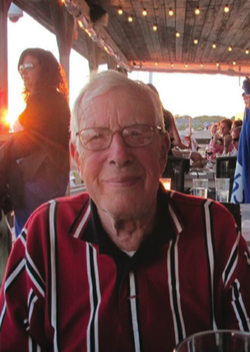One of Colgate’s Oldest Living Alumni Unfolds His College Experience from the 1940s

Alfred R. Koch
Alfred R. Koch, one of Colgate’s oldest-living alumni at 95 years old, shared his campus experience in celebration of Colgate’s newest milestone, the Bicentennial celebration. Koch offered insight on his time on the Colgate campus, reflecting on the past and looking forward to the future.
Although Koch is a Class of 1945 alumnus, he graduated with the class of 1947. He, along with many other Colgate students, was drafted into World War II. With 300 students in his class and 1,000 students in the school, Koch was among those able to both serve his country and finish his college education.
The school reached out to students informing them of the draft, and soon, much of the student body was preparing for war. These students continued their studies when necessary, and Colgate offered them career guidance. Tuition at the time was $600, which is equivalent to $8404.87 today. The annual cost to attend in 2018 stands at $71,708.00, which is 8.5 times greater than the cost to attend at Koch’s time. Colgate students who had, like Koch, served in the military were relieved of these costs when they returned from war – the government covered their expenses.
Koch said the campus was less active during the war; clubs and organizations were less prominent as many students were obliged to take a gap in their education.
Koch described how Colgate was a shockingly different campus in the 1940s. Studying the sciences with a focus in chemistry and physics, Koch was involved in the Commons Club. Non-existent today, the Commons Club was a forum of activities for those who were not involved in fraternities. Koch said that there were 13 fraternal organizations at the time, including the Commons Club, who would participate in intramural sports and compete against one another. According to Koch, football, squash and basketball were popular sports on campus. Ice hockey was located outside, so games and practices accommodated the weather.
In the 40s, chapel attendance was mandatory every weekday. All freshmen were required to wear green beanies to chapel, facing punishment if they failed to do so. At these chapel meetings and lectures, the administration briefed the students on news regarding upcoming activities and events, while the crowd expressed school pride. The chapel also staged performances by jazz bands, hypnotists and even opera singer Marian Anderson. Students would make the hike down Cardiac Hill (now the Persson steps) from the chapel to the Student Union, which served as a dining hall.
Koch’s uncle and four brothers went to Cornell, but Koch chose Colgate due to his preference for a smaller school.
Koch offered advice for Colgate’s current student population. He said to develop friend- ships and partake in activities of interest, as these created lasting impacts on him. He mentioned that although Colgate is a completely different place now, it is always important to study, have fun and remember the good times. Koch has kept in touch with his roommates for many years, and attended his class reunions for 50 years.
Contact Amanda Capra at [email protected].






